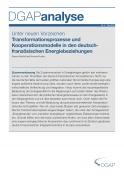Cooperation on energy matters has been a matter of priority in Franco-German consultations for some time. Not only is close coordination advisable due to the geographic proximity of Europe’s two largest national energy markets. Their growing degree of economic (and energy) integration makes it necessary. The significance of energy policy for industrial policy on both sides of the Rhine is unmistakable. While policy approaches in the two countries’ energy sectors have differed in the past and in some ways continue to do so, this has not diminished the topic’s relevance or lessened the importance of cross-border cooperation. What is new is that both states are now pursuing the same goal: energy transformation (known as Energiewende, or transition énérgetique, depending on which side of the Rhine you are on). There are therefore plenty of good reasons to strive for closer cooperation on matters of energy policy and, in doing so, help bridge some of the gaps in the sputtering Franco-German relationship.
Under New Auspices
New models of cooperation for Franco-German energy relations
France and Germany have both been pursuing the goal of energy transformation for some time, albeit in different ways. As the Energiewende, or transition énérgetique, gathers steam, there are plenty of good reasons to foster even closer cooperation on matters of energy policy, and in doing so, help bridge some of the gaps in the sputtering Franco-German relationship. (DGAP analysis in German.)
Bibliografische Angaben
Diechtl, Franca, and Severin Fischer. “Under New Auspices.” May 2015.DGAPanalyse 5 (May 2015), 13 pp. In German.
Programm


